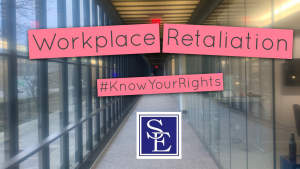An employee is protected from retaliation from his or her employer when he or she engages in protected activity under the New Jersey Law Against Discrimination. But what constitutes protected activity? Is any complaint covered? Or does the employee complaint have to one that the complained of conduct violate the law? The Supreme Court of New Jersey answered these questions concerning the standard in a 2013 decision in the case of Battaglia v. United Parcel Service Inc., in holding that an employee engages in protected activity when employee’s complaint is reasonable and made with a good faith belief that the complained of conduct violates the LAD.
The Battaglia decision involved a case of sexual harassment retaliation. Michael Battaglia had been employed with UPS since 1985, when he began as a driver and worked his way up the ranks. In 2001, Battaglia became the division manager of UPS’s South Division and he began supervising Wayne DeCraine. During this time, Battaglia became aware of DeCraine’s derogatory remarks about women, including sexually inappropriate comments about female employees at UPS. Battaglia took steps at that time, in accordance with UPS policy, to address DeCraine’s conduct and behavior. For unrelated reasons, thereafter, Battaglia was moved through several other departments at UPS and ultimately in 2004, returned to working with DeCraine – now with DeCraine supervising Battaglia as a division manager.
After some time, DeCraine began making what Plaintiff perceived to be a series of inappropriate sexual comments. While the comments were only made in the presence of male employees, the comments were about other female employees. Battaglia asserts that he spoke with DeCraine each time he made a comment and further met with their supervisor who had also heard these remarks.
Battaglia continued to complain to DeCraine directly about his inappropriate behavior. He further complained to DeCraine about practices in the division involving misuse of company credit cards. Thereafter, in January 2005, Battaglia wrote an anonymous complaint to his employer’s human resources department describing that “leaders of the district used language you wouldn’t use with your worst nightmare”. He felt that these women were misrepresented and unable to defend themselves. While Human Resources began investigating the complaint, the department found it difficult to investigate because it was a generic complaint without specific details. The Human Resources Manager made a determination that the anonymous complaint had been made by Battaglia.
Thereafter, a series of events ensued following which Battaglia was demoted. Battaglia perceived his demotion to be in retaliation for his anonymous complaint made to Human Resources about practices and behaviors in the workplace and filed a lawsuit. Battaglia’s lawsuit alleged violations of the New Jersey Law Against Discrimination and the Conscientious Employee Protection Act. The New Jersey Law Against Discrimination prohibits unlawful discrimination in the workplace. The Conscientious Employee Protection Act is a whistleblower law protecting employees from unnecessary retaliation for objections and complaints of violations of rules, laws or regulations.
At trial, the jury returned a verdict in Battaglia’s favor, holding UPS liable for violations of the Law Against Discrimination and the Conscientious Employee Protection Act, and awarded him $500,000 for economic damages and another $500,000 for emotional distress damages. The court remitted Plaintiff’s damages for emotional distress to $205,000.
Following cross-appeals to the Appellate Division, cross-petitions for certification to the Supreme Court were granted. One of the primary issues before the Court involved the Appellate Division’s overturning of the Law Against Discrimination violation. The Appellate Division determined that because there was no evidence in the records of actual discrimination against women or a hostile work environment as related to women, Plaintiff had no grounds to challenge his demotion because his complaints were not protected.
The Supreme Court disagreed with the Appellate Division and found that the broad purposes of the Law Against Discrimination applied. They found that as long as complaints about behavior or activities in the workplace are reasonable and made in good faith that the conduct complained of violates the Law Against Discrimination, it is sufficient to pursue such a claim. The Supreme Court further echoed that the Law Against Discrimination is intended to protect the public’s strong interest in a discrimination-free workplace and thus one who voices a complaint of discrimination does not have to be the direct target or victim of said discrimination to be protected. Accordingly, the Appellate Division’s overturning of the jury verdict was reversed, thereby reinstating the Law Against Discrimination verdict.
Ultimately, Battaglia prevailed and laid a path for all workers in New Jersey to be free of retaliation from employers when they make good faith and reasonable complaints of unlawful activity. With the help of this decision, New Jersey law continues to provide its employees with significant legal protections against employers who discrimination and retaliate against employees for bringing legitimate issues of concern to their attention.
 New Jersey Employment Lawyers Blog
New Jersey Employment Lawyers Blog


